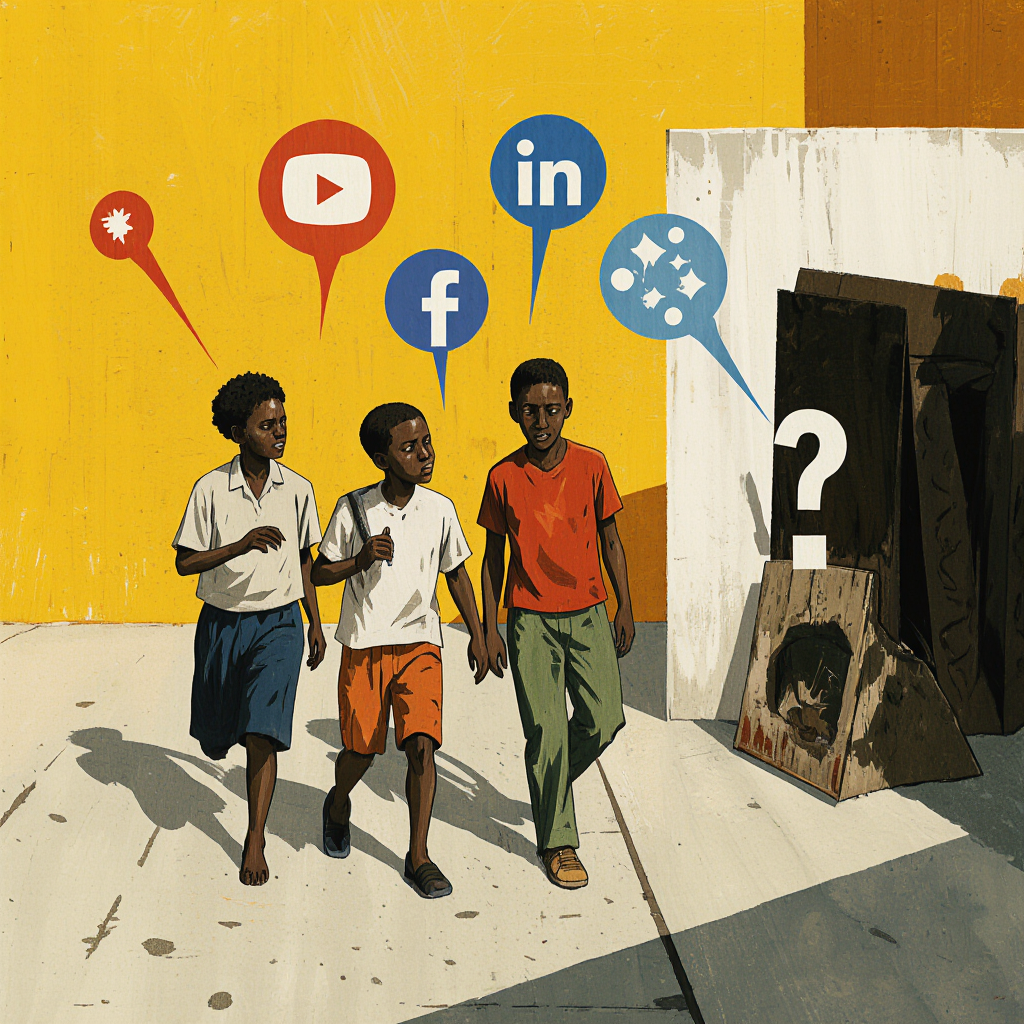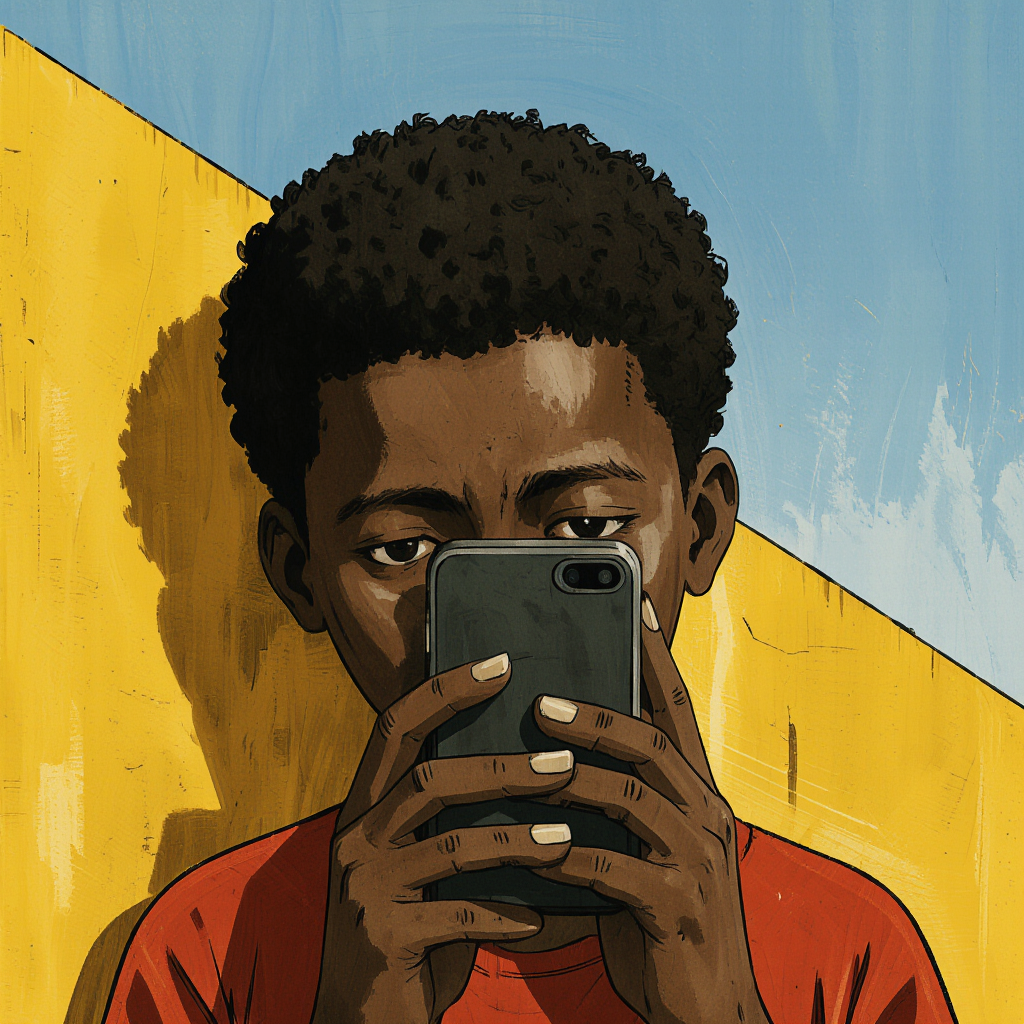Trigger Warning and Disclaimer: The following content includes personal and sensitive experiences. We encourage you to engage with the piece in whatever way feels right for you. You can read our full editorial notice here.
When you scroll through social media or your inbox, that “job offer” or “friendly DM” may look harmless. But in Sudan today, these digital promises can lead directly to forced labour, trafficking, or even being recruited as a child soldier.
How Online Exploitation Works
While exploitation mostly happens offline, online platforms amplify the risks. Criminals use social media to market “jobs” or “travel opportunities” in coded language. Public posts drop vague hints, then shift interested youth into encrypted groups where scams unfold. Many of the closed chats claim to offer work, marriage, or migration when they are really fronts for trafficking. Young people, especially boys, are coerced into hazardous labour or armed recruitment.

Warning Signs & Community Vigilance
Exploitation networks thrive because victims and their peers don’t always recognize the signs (Safeguarding Network). Watch out for friends who:
- Spend secretive, long hours online in new groups.
- Start repeating extremist slogans or conspiracy theories that scapegoat ethnic, religious, humanitarian or political groups”
- Suddenly idolize fighters or glorify violence
If you notice this, don’t argue or shame them; experts suggest listening, empathizing, and opening a conversation. Many youths join because they are lonely, desperate, or searching for identity.
How to Stay Safe: Building Digital Awareness
One of the best ways to stay safe is to double-check before acting or sharing:
- Verify the account or content through different sources.
- Avoid sharing things that aren’t confirmed, especially if you are unsure if the message is too good to be true.
- Report suspicious or harmful content directly to platforms, as they have systems in place to deal with harmful content.
- Be skeptical of offers of quick money, if something feels off don’t engage
Those outside Sudan can also play a part by:
- Amplifying awareness campaigns.
- Supporting fact-checking.
- Sharing trusted information about safe migration options with families back home.

Why Boys Are Targeted
Since April 2023, Sudan’s war has created one of the worst humanitarian crises in decades. Families are split apart, the economy has collapsed, and food and income are scarce. In this vacuum, human exploitation has surged, and with desperation at an all-time high, criminals are using online platforms to target the most vulnerable: young boys.
While women face hidden exploitation due to stigma around sexual violence, boys are often more directly lured into online traps. Offers of quick money, belonging, or “protecting the community” mirror the same radicalization pathways extremist groups use globally: exploiting isolation, anger, or the search for status. In Sudan’s context, these pathways translate into child soldier recruitment, labour exploitation, and smuggling risks.

Additional Resources from Experts: Where to Get Help and Protection
If you or someone you know is at risk of exploitation or child soldier recruitment, these organizations and resources can help:
- UNICEF
- Works globally to protect children from exploitation and violence, including in conflict zones.
- World Vision
- Runs programs in Sudan and other countries to protect children and support their education.
- Save the Children
- Provides child protection, education, and emergency support for young people in crisis areas.
Sudan’s National Action Plan to Counter and Prevent Human Trafficking (2021–2023)
This government policy offers a framework for protecting young people from trafficking and exploitation. It can be adapted to address new threats, including online exploitation.
- Sudan Prevention of Sexual Exploitation and Abuse Network (PSEA)
- Offers reporting channels and protection for survivors, especially in cases of online grooming.
- On August 20, 2025, the PSEA Network published Standard Operating Procedures (SOPs) for how organizations in Sudan can quickly and safely refer survivors to the right support, following a Victim/Survivor Centered Approach.
Conclusion
Sudan’s war has opened the door to exploitation both offline and online. But knowledge is power: recognizing the warning signs and refusing to engage with suspicious posts can save lives. Young boys are at the highest risk, but with community vigilance and solidarity, digital traps can be dismantled.
What’s still needed is a stronger bridge between traditional child protection work and the digital spaces where recruiters and scammers now operate. Tackling it will require integrating digital safety into child protection programming, empowering local youth-led groups, and pressing tech companies to close the detection gaps in Sudanese contexts.
